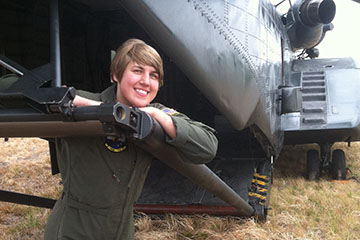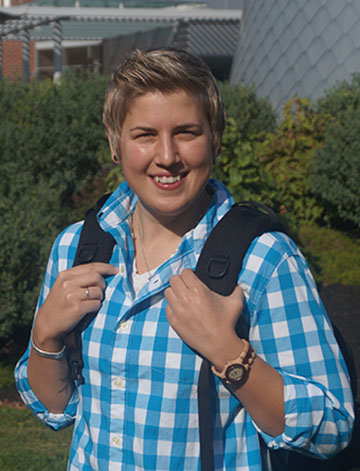
10/19/2017
Hard work is all Corrine Edick knows.
Growing up in a blue-collar family in Brewerton, N.Y., just north of Syracuse, she worked three part-time jobs when she was in high school. She enlisted in the U.S. Navy after graduating in 2009, which eventually brought 18-hour work days for months at a time and an eye-opening tour in South Korea in 2012. Today, at 26, she’s a SUNY Cortland biology major with a 4.03 grade point average, an aspiring physician assistant and the first person in her family to attend college.
Edick also is SUNY Cortland’s latest recipient of a competitive scholarship from Alpha Sigma Lambda, the national honor society for non-traditional students. She’s one of only 12 students from across the country to earn the $3,000 prize and the third non-traditional student from SUNY Cortland to be recognized since 2010.
The College defines its non-traditional students as undergraduates who are at least 24 years old or have had an interruption or delay in their education since high school. Approximately 300 of them currently study on campus.
“As a family, we didn’t have a lot of money when I was a kid, but both of my parents worked really, really hard,” said Edick, who is completing her final semester at SUNY Cortland this fall. “I grew up seeing how hard they worked, especially my mom, and I thought that’s just how it is and that’s how it has to be.”
As far back as she can remember, serving others was part of Edick’s DNA. Her childhood best friend had cerebral palsy and used a wheelchair. They still played together and she often assisted him with daily tasks such as eating and getting dressed.
“I had this inkling to help at 10 years old,” she said. “That’s what made me happiest. I feel like my role in life is to be a caregiver. That’s why I was put here — to help people feel more comfortable or to help them feel better in general.”
During high school, Edick worked as a certified nursing assistant in addition to two other part-time jobs. She befriended patients with dementia, treating them like members of her own family despite the difficulties that came with their care.
Edick knew as a teenager that she wanted to one day work in the healthcare field. But as her senior year of high school progressed, she felt pulled to a different type of service in the military.
She served four years in the U.S. Navy from 2010 to 2014 as a dry air crewman, performing special operations by helicopter. Her crew was trusted to detect enemy mines in the ocean. Once, during a six-month deployment in Pohang, South Korea, an emergency landing was required due to engine failure.
Edick said the military experience tested her physical, mental and emotional limits, especially when she lived on a Korean military base. Still, she persisted and fulfilled her service commitment.
“Being in Korea and experiencing a different way of life made me appreciate (the U.S.) even more,” Edick said. “It’s something that’s difficult to explain unless you’ve been in that situation. I was just proud to make it through and serve my country.”
She chose to attend SUNY Cortland because of what she sensed at an Open House event in 2015: quality science facilities in Bowers Hall and, more importantly, a campus that represented comfort and care. But success didn’t come easy, especially at first.

“I had been out of high school for five years, so that first semester was tough,” she said.
A course in botany proved particularly difficult. Edick considered changing majors, but her advisor, Professor Steven Broyles, encouraged her to continue.
“Looking back on it, I appreciate that experience,” she said of the botany course. “Because, in reality, it set me up for the major. I learned early on that it’s not easy. That class set up my study habits for every one in the future.”
Edick has carried a 4.0 grade point average every semester since freshman year. But like many non-traditional students at SUNY Cortland, her commitments weren’t limited to life on campus. Her mother remarried and moved to Genoa, N.Y., a small town located a half-hour west of Cortland, while Edick was in the military. Her mother also was diagnosed with fibromyalgia, a condition that attacks the nervous system.
Edick now lives in Genoa to look after her family’s dog rescue operation and help take care of her mother, who she cites as her biggest source of inspiration.
“My work ethic is largely due to her,” said Edick, whose ultimate goal is to serve developing countries through a program such as Doctors Without Borders. “My mom was and still is all that I aspire to be — strong, proud, kind, compassionate, supportive and giving.”
This past summer, Edick worked 45-hour weeks at a restaurant to continue saving money for her education. College after the military always was her goal. Post-9/11 GI Bill benefits help fund her studies now, but she knows that the path to be a physician assistant will come with even greater costs. Those additional years of post-graduate training make the recent Alpha Sigma Lambda scholarship even more meaningful to her.
“It may sound crazy, but I’m trying to pay off school before I get out,” Edick said. “I think I’m futuristic in that way. The sooner I can pay off school, the sooner I can go do charitable work, and I know that’s what will make me happiest.
“I also know it’ll be hard at the same time, but that’s what I’m used to.”